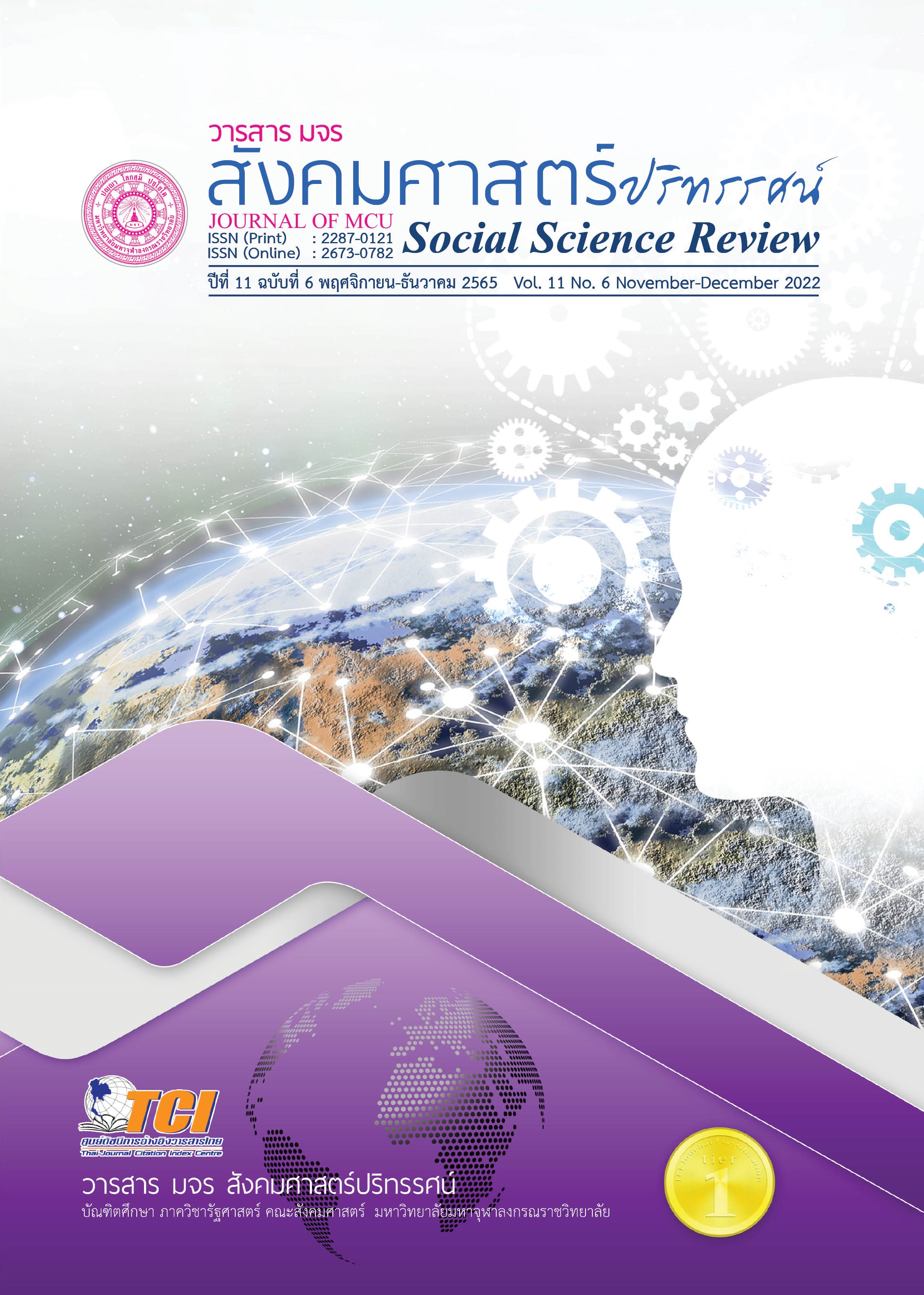ความอยู่เย็นเป็นสุขในห้วงสถานการณ์ระบาดวิทยาโควิด-19 และแนวทางการลดปัญหาความรุนแรงในครอบครัว
คำสำคัญ:
ความรุนแรงในครอบครัว, ความอยู่เย็นเป็นสุข, โควิด-19บทคัดย่อ
การวิจัยนี้ใช้วิธีวิทยาวิจัยเชิงคุณภาพเพื่อศึกษาสาเหตุ แนวทางแก้ไขที่สอดคล้องกับการเสริมสร้างความอยู่เย็นเป็นสุขในบริบทจังหวัดเชียงรายและสถานการณ์การระบาดวิทยาของโรคอุบัติใหม่ โควิด-19 ผู้ให้ข้อมูลหลักได้แก่ ตัวแทนผู้นำชุมชน ตัวแทนผู้นำองค์กรปกครองส่วนท้องถิ่น หน่วยงานภาครัฐที่สนับสนุนการพัฒนาครอบครัว เด็ก และสตรี ผู้นำทางศาสนา ตัวแทนหน่วยงานด้านการศึกษาและสาธารณสุข นักวิชาการและผู้เชี่ยวชาญด้านการพัฒนาสังคม รวมถึงผู้ที่เคยถูกกระทำความรุนแรงในครอบครัว จำนวน 50 คน
ผลการวิจัยพบว่า ความอยู่เย็นเป็นสุขในห้วงสถานการณ์ระบาดวิทยาโควิด-19ของประชาชน มีจุดเริ่มต้นจากความผาสุกในครอบครัว และดุลยภาพของการมีสุขกายและสุขภาพใจที่ดี มั่นคง สามารถพึ่งตนเองได้ และผลการวิจัยค้นพบสาเหตุและองค์ประกอบปัญหาความรุนแรงในครอบครัว ได้แก่ 1) สถานการณ์บริบทสังคม 2) สถานการณ์ทางเศรษฐกิจและ 3) สภาพแวดล้อมทางสังคมและกระบวนการขัดเกลาทางสังคม โดยมีแนวทางการลดปัญหาความรุนแรงในครอบครัวเพื่อส่งเสริมการสร้างความอยู่เย็นเป็นสุขในห้วงสถานการณ์ระบาดวิทยาโควิด-19 ของจังหวัดเชียงราย คือ การสร้างค่านิยมและร่วมสร้างความเข้าใจ กลไกทางสังคมต้องไม่เพิกเฉยต่อความรุนแรงในครอบครัว ภาครัฐและท้องถิ่นต้องสนับสนุนผู้ถูกทำร้ายอย่างครอบคลุมทุกมิติ
เอกสารอ้างอิง
กรมกิจการสตรีและสถาบันครอบครัว. (2564). รายงานความรุนแรงในครอบครัว (ระดับจังหวัด) ประจำเดือนมีนาคม 2564. กรุงเทพฯ: สำนักงานสภาพัฒนาการเศรษฐกิจและสังคมแห่งชาติ (สศช.).
ชุตินาฏ พงษ์ทองวัฒนา. (2561). เปิด 3 ปัจจัยนำไปสู่ความรุนแรงในครอบครัวเผยผู้ชายก่อปัญหามากสุด. สืบค้น 7 ตุลาคม 2563, จาก https://news.mthai.com/special-report/617615.html.
ฐิติพร โยทาพันธ์. (2563). ปัญหาความรุนแรงในครอบครัว แก้ไขได้ถ้าทุกฝ่ายร่วมมือกัน. สืบค้น 11 กุมภาพันธ์ 2564, จาก https://www.thaihealth.or.th/Content/53055-ปัญหาความรุนแรงในครอบครัว%20แก้ไขได้ถ้าทุกฝ่ายร่วมมือกัน.html.
บัวพันธ์ พรหมพักพิง. (2550). บทสังเคราะห์ สร้างสุขภาวะเพื่อมุ่งสู่อยู่ดีมีสุข: บทสังเคราะห์ตัวชี้วัดกระบวนการสร้างชุมชนอยู่ดีมีสุขในภาคอีสาน (รายงานผลการวิจัย). กลุ่มวิจัยความอยู่ดีมีสุขและการพัฒนาอย่างยั่งยืน (WeSD). ขอนแก่น: มหาวิทยาลัยขอนแก่น.
บุญวรา สุมะโน เจนพึ่งพร. (2563). ระวังความรุนแรงในโรคระบาด เมื่อ “บ้าน” อาจไม่ใช่ที่ปลอดภัยสำหรับทุกคน. สืบค้น 11 กุมภาพันธ์ 2564, จาก https://tdri.or.th/2020/04/domestic-violence-victims-during-covid19/
พัชรี ดำรงสุนทรชัย. (2550). แนวทางการจัดการความรู้เพื่อสุขภาวะชุมชน (วิทยานิพนธ์ครุศาสตรดุษฎีบัณฑิต สถาบันวิทยบริการ). กรุงเทพฯ: จุฬาลงกรณ์มหาวิทยาลัย.
สำนักงานคณะกรรมการพัฒนาการเศรษฐกิจและสังคมแห่งชาติ (สศช.). (2564). สืบค้น 11 กุมภาพันธ์ 2564, จาก https://shorturl.asia/8SeiZ
สุพัตร ทองงาม. (2552). ทุนทางสังคมของเยาวชนเพื่อสุขภาวะของชุมชนในเทศบาลตำบลขามใหญ่ อำเภอเมืองอุบลราชธานี จังหวัดอุบลราชธานี (รายงานการศึกษาอิสระ ปริญญารัฐประศาสนศาสตรมหาบัณฑิต สาขาวิชาปกครองท้องถิ่น). ขอนแก่น: มหาวิทยาลัยขอนแก่น.
หนึ่งหทัย ขอผลกลาง. (2550). ปัจจัยแห่งการดำรงอยู่หรือล่มสลายของครอบครัว. วารสารเทคโนโลยีสุรนารี, 1(2), 45-54.
อาทิตย์ บุดดาดวง. (2555). ความสามารถในการนำทุนทางสังคมออกมาใช้ของชุมชนบ้านบางไพรอำเภอบางคนทีจังหวัดสมุทรสงคราม. วารสารสมาคมนักวิจัย, 17(1), 29-41.
Loren, R. E., Vaughn, A. J., Langberg, J. M., Cyran, J. E., Proano-Raps, T., Smolyansky, B. H., & Epstein, J. N. (2015). Effects of an 8-session behavioral parent training group for parents of children with ADHD on child impairment and parenting confidence. Journal of Attention Disorders, 19(2), 158–166.
Nelson-Jones, Richard. (1992). Group Leadership: A Training Approach. California: Brook/Cole.
Travis, J. W., & Ryan, R. S. (2004). Wellness index: A self-assessment for health and vitality (3rded.). Berkeley, CA: Celestial.
ดาวน์โหลด
เผยแพร่แล้ว
รูปแบบการอ้างอิง
ฉบับ
ประเภทบทความ
สัญญาอนุญาต
ลิขสิทธิ์ (c) 2022 วารสาร มจร สังคมศาสตร์ปริทรรศน์

อนุญาตภายใต้เงื่อนไข Creative Commons Attribution-NonCommercial-NoDerivatives 4.0 International License.
เพื่อให้เป็นไปตามกฎหมายลิขสิทธิ์ ผู้นิพนธ์ทุกท่านต้องลงลายมือชื่อในแบบฟอร์มใบมอบลิขสิทธิ์บทความให้แก่วารสารฯ พร้อมกับบทความต้นฉบับที่ได้แก้ไขครั้งสุดท้าย นอกจากนี้ ผู้นิพนธ์ทุกท่านต้องยืนยันว่าบทความต้นฉบับที่ส่งมาตีพิมพ์นั้น ได้ส่งมาตีพิมพ์เฉพาะในวารสาร มจร สังคมศาสตร์ปริทรรศน์ เพียงแห่งเดียวเท่านั้น หากมีการใช้ภาพหรือตารางหรือเนื้อหาอื่นๆ ของผู้นิพนธ์อื่นที่ปรากฏในสิ่งตีพิมพ์อื่นมาแล้ว ผู้นิพนธ์ต้องขออนุญาตเจ้าของลิขสิทธิ์ก่อน พร้อมทั้งแสดงหนังสือที่ได้รับการยินยอมต่อบรรณาธิการ ก่อนที่บทความจะได้รับการตีพิมพ์ หากไม่เป็นไปตามข้อกำหนดเบื้องต้น ทางวารสารจะถอดบทความของท่านออกโดยไม่มีข้อยกเว้นใดๆ ทั้งสิ้น





